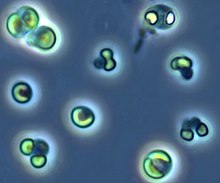| Picocystis | |
|---|---|

| |
| Picocystis salinarum | |
| Scientific classification | |
| Clade: | Viridiplantae |
| Division: | Chlorophyta |
| Class: | Picocystophyceae Eikrem & Lopes dos Santos |
| Order: | Picocystales Eikrem & Lopes dos Santos |
| Family: | Picocystaceae Eikrem & Lopes dos Santos |
| Genus: | Picocystis R.A.Lewin 2001 emend. Eikrem & Lopes dos Santos 2017 |
| Species: | P. salinarum |
| Binomial name | |
| Picocystis salinarum R.A.Lewin 2001 | |
Picocystis is a monotypic genus of green algae, the sole species is Picocystis salinarum. It is placed within its own class, Picocystophyceae in the division Chlorophyta.
Structure
Picocystis salinarum cells under normal conditions have a spherical or oval shape. Their size ranges from 2 to 3μm (micrometer, 10^-6) in diameter. Under conditions of nutrient depletion they appear to form a trillobe shape. This trillobe shape gives it the nickname Mickey Mouse, due to its appearance to the famous character's head. The general appearance resembles that of a standard green algae.
The pigments are composed mainly from chlorophyll a and b and the carotenoids violaxanthin, alloxanthin, monadoxanthin, neoxanthin, lutein, diatoxanthin and zeaxanthin.
The cell wall is mainly composed of polymers of the monosaccharide arabinose, polyarabinose.
Habitat
The species have been found in saline or hypersaline alkaline environments.

References
- Guiry, M.D.; Guiry, G.M. "Picocystis". AlgaeBase. World-wide electronic publication, National University of Ireland, Galway.
- Lopes Dos Santos A, Pollina T, Gourvil P, Corre E, Marie D, Garrido JL, Rodríguez F, Noël MH, Vaulot D, Eikrem W (October 2017). "Chloropicophyceae, a new class of picophytoplanktonic prasinophytes". Scientific Reports. 7 (1): 14019. Bibcode:2017NatSR...714019L. doi:10.1038/s41598-017-12412-5. PMC 5656628. PMID 29070840.
- ^ Lewin RA, Krienitz L, Goericke R, Takeda H, Hepperle D (2000). "Picocystis salinarum gen. et sp nov (Chlorophyta) - a new picoplanktonic green alga". Phycologia. 39 (6): 560–565. doi:10.2216/i0031-8884-39-6-560.1. S2CID 83584521.
- Lopes Dos Santos A, Gourvil P, Rodríguez F, Garrido JL, Vaulot D (February 2016). "Photosynthetic pigments of oceanic Chlorophyta belonging to prasinophytes clade VII". Journal of Phycology. 52 (1): 148–55. doi:10.1111/jpy.12376. hdl:10261/129034. PMID 26987097. S2CID 3160723.
- Krienitz L, Bock C, Kotut K, Luo W (January 2012). "Picocystis salinarum (Chlorophyta) in saline lakes and hot springs of East Africa". Phycologia. 51 (1): 22–32. doi:10.2216/11-28.1. S2CID 84149071.
- Stamps BW, Nunn HS, Petryshyn VA, Oremland RS, Miller LG, Rosen MR, et al. (November 2018). "Metabolic Capability and Phylogenetic Diversity of Mono Lake during a Bloom of the Eukaryotic Phototroph Picocystis sp. Strain ML". Applied and Environmental Microbiology. 84 (21). doi:10.1128/AEM.01171-18. PMC 6193381. PMID 30120120.
| Taxon identifiers | |
|---|---|
| Picocystis | |
This green algae-related article is a stub. You can help Misplaced Pages by expanding it. |